WHEELS OF INDUSTRY.
Page 4
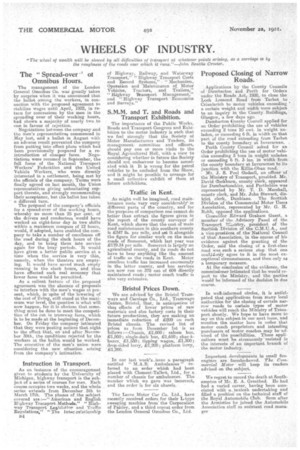
Page 5
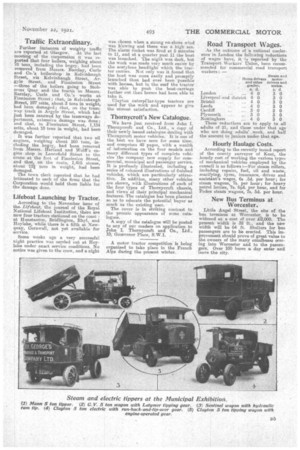
Page 6
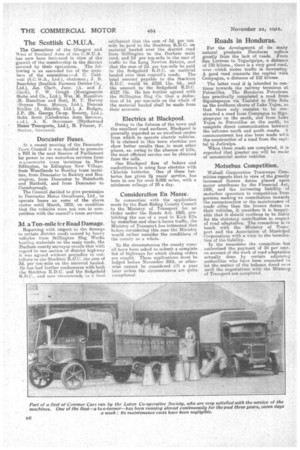
Page 7
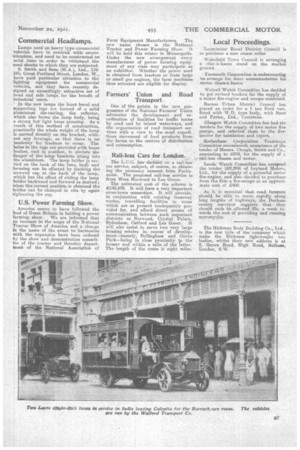
Page 8
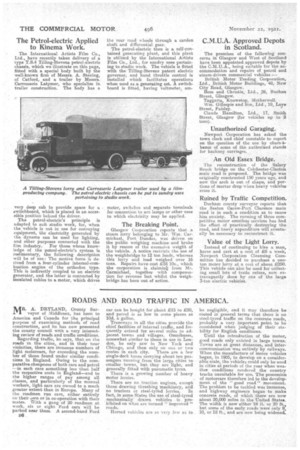
If you've noticed an error in this article please click here to report it so we can fix it.
The wheel of wealth will be slowed by all difficuities of transport at whatever points arising, as a carriage is bp the roughness of the roads over which it runs."—john Beattie Crozier,
The "Spread-over -) ot Omnibus Hours.
The nianagement of the London General Omnibus Co. waS greatly taken by surprise when it was announced that the ballot among the workers, in connection with the proposed agreement to stabilize wages until April, 1922, in return for concessions by the men in the spreading over of their working hours, had shown a majority of nearly two to one in favour of rejection. Negotiations between the company and the men's representatives commenced in May last, and a ballot in August with an adverse result prevented the company from putting into effect plans which had been provisionally prepared for a re
introduction of cheaper fares. Negotiations were resumed in September, the full force of the National Transport Workers' Federation and the United Vehicle Workers, who were directly interested in a settlement, being met by the officials of the company. Terms were finally agreed on last month, the Union representatives giving unhesitating support thereto, and strongly recommending their acceptance, but the ballot has taken a different turn.
The proposal of the company's officials for a spread-over of the working hours, whereby no more than 25 per cent. of the drivers and conductors would have worked an eight-hour day in two shifts within a maximum compass of 12 hours, 'would, if adopted, have enabled the company to take a number of omnibuses off the road during the slack hours of the day, and to bring them into service again for the busy periods. "It would have given a better public service at a time when the service is very thin, namely, when the theatres are emptying. It would have saved much empty running in the slack hours, and thus haveeffected such real economy that lower fares would be permitted.
As a salient feature of the proposed agreement was the absence of proposals to interfere with the men's wages at present, which, in •spite of the lowering of the cost. of living, still stand at the maximum war level; the question is what will i now happen,. for it s obvious that somethieg must be done to meet the competition of the cut in tramwayfares, which ie to be made at the beginning of December. On Friday the company intimated that they were posting notices that night, to the effect1 that., an and after November 30th, the conditions rejected by the workers at the ballot would be worked. The executive of the men's Union were considering the new situation arising from the company's intimation.'
Instruction in Transport.
As au instance of the encouragement given to students by the University of Michigan, highway transport is the subject of a series of courses for men. Each course occupies two weeks, and the whole series extends from December 5th to March 17th, The phases of the subject covered are :—" American and English Highway Transport. Methoda," " Highway Transport Leatslation and Traffic Regulation;". "The Inter relationship P4 of Highway, Railway, and Waterway Transport,"' "Highway Transport Costs and Record Systems," "Mechanism, Operation and Maintenance of Motor Vehicles, Tractors, and Icailers," "Highway Transport Management," and ". Highway Transport Economics and Surveys."
S.M.M. and T. and Roads and Transport Exhibition.
The importance of the Public Works, Roads and Transport Congress and Exhibition to the motor industry is such that we feel strongly that the Society of Motor Manufacturers and Traders its managementcommittee and officers, should pay one or more visits to the Royal Agricultural Hall, with a view to considering whether in future the Society should not endeavour to become associated with it It is wrong for the petzol vehicles to be excluded from the Show, and it might be possible to arrange for a small collective exhibit of them at future exhibitions.
Traffic in Kent.
As might. well be imagined, road maintenance costs vary very considerably' in different, parts of the country, and for the purposes of comparison one cannot do better than extract, the figures given in the report of the county surveyor of Kent, which shows that the cost of main road maintenance in this southern county is £347 8s. per mile, and set it alongside the figure for similar work on the main roads of Somerset, which last year was £179.34 per mile. Somersetis largely an agricultural county, and its roads do not have to bear anything like the amount of traffic as the roads in Kent. Motor omnibus traffic has increased enormously in the latter county, and bus services are, now run on. 378 out of 604 directly maintained roads ; motor coach traffic is also very extensive.
• Bristol Prices Down.
We are advised hy the Bristol Tramways and Carriage Co., Ltd., Tramways Centre, Bristol, that, in anticipation of the effects of lower prices of raw materials and also factory costs in their future productions, they are making an immediate reduction of £200 on each Bristol chassis. The revised list of 'prices as from December let is as follows :—Chassis, £1,050; saloon bus, £1,800; single-deck bus, £1,650; char-abanes, £1,550; tipping wagon, £1,300; drop-sided lorry, £1,200; platform lorry, £1,200.
In our last weeles.issue a paragraph entitled " M.A.B. Ambulances " referred to an order which had been placed with Clement-Talbot, Ltd., for a number of chassis for ambulances. The number which we gave was incorrect, and the order is for six chassis.
The Teacre Motor Car Co. Ltd., have recently received orders for their L-type sweeping machine from the Corporation of Paisley, and a third repeat order from the London General Omnibus Co., Ltd.
Proposed Closing of Narrow Roads. • Applications by the County Councils of Dumbarton and Perth for Orders under the Roads Act, 1920, to close the Lech Lomond Road from Tarbet to Crianlarieh to motor vehicles exceeding a certain weight and width were subject to an inquiry in the County Buildings, Glasgow, a few days ago.
Dumbarton County Council applied for an Order prohibiting the use of vehicles exceeding 2 tons 10 cwt. in weight unladen, or exceeding 6 ft. in width on that part of the road extending from Tarbet to the county boundary at Inverarnan. Perth County Council asked for an Order prohibiting the use of motor vehicles exceeding 3 tons in weight unladen or exceeding 6 ft. 3 ins, in width from the county boundary at Inverarnan to its junction with the Killin-Oban road.
Mr. J. S. Pool Godsell, an officer of the Ministry of Transport, presided. Mr. David Cockburn, county clerk, appeared for Dumbartonshire, and Perthshire was represented by Mr. T. D. Marshall, county clerk, and Mr. John Stewart, district clerk, Dunblane. The Scottish Division of the Commercial Motor Users Association, represented by Mr. G. H. Robb, opposed the applications. Counenlor Edward Graham Guest, a member of the ..,%dvisory Panel of the Transport M.Laistry, president of the Seottish Division of the C.M.U.A., and a vice-president of the National Council of that Association, in the course of his evidence against the granting of the Order, said the closing of a first-class road was such a serious step that one couf,LlerJy. agree to it in the most exceptional circumstances, and then only as a temporary measure. At the conclusion of the evidenee, the commissioner intimated that he would report to the Ministry, and the parties would he informed of the decision in due Course.
In well-informed circles, it, is anticipated that applications from many local authorities for the closing of certain narrow roads to certain types of motor vehicles will reach the Ministry of Transport shortly. We hope to have more to say on this subject in our next issue, and mention the matter here in order that motor coach proprietors and intending purchasers of moter ecraches may be advised of the possibilities. These applications must be strenuously 'resisted in the interests of an important branch of the Motor industry.
Important developments in small fireengines are foreshadowed. The a 07n, menial Motor will keep its readers advised on thasubject.
We regret to record the death at Southampton of Mr. E. A. Greathed. He had had a varied career, having been associated with a,taxicab undertaking and filled a position on the technical staff of the Royal Automobile Club. Soon after the Armistice he joined the Automobile Assoeiatien staff as assistant road manager
Traffic Extraordinary.
• Further instances of weighty traffic are reported at Glasgow. At the last meeting of the corporation it was reported that four boilers, weighing about (8 tons, including the bogey, had been removed from Messrs. Barclay, Curie and Co.'s boilershop in Kelvinhaugh Streets via Kelvinhaugh Street, Argyle Street, and Finniesthn Street —three of the boilers going to Slobcross Quay andthe fourth to Messrs. Barclay, Curie and Co.'s works at Finnieston Street ; that, in Kelvinhaugh Street, 297 setts, about 3 tons in weight, had been damaged; that, on the tramway track in Argyle Street, which had just been renewed by the tramways department, extensive damage was done; and that, in .iFinnieston Street, 1,134 setts, about 10 tons in weight, had been damaged.
It was further reported that two oil engines, weighing about 160 tons, including the bogey, had been removed from Messrs. Harland and Wolff's engine shop in Lancefield Streetto the crane at the foot of Finnieston Street, and that, on the route, 1,415 stones, about 14 tons in weight, had been damaged. The town clerk reported that he had intimated to each of the firms that the Corporation would hold them liable for the damage done.
Lifeboat Launching by Tractor.
According to 'the November issue of the Lifeboat, the journal of the Royal National Lifeboat Institution, there are now four tractors stationed on the coast : at Hunstantnn, Bridlington, Rhyl, anti Hoylake, while there is a fifth at New. quay, Cornwall, not yet available for service.
Some weeks ago a very successful night practice was carried out at Hoylake under exact service conditions. No notice was given to the crew, and a night
was chosen when a strong ion-shore wind was V.-owing and there was a high sea. The alarm rocket was fired at 5 minutes to 11, and at a quarter past 11 the boat was launched. The night was dark, but the work was made very much easier by the acetylene headlight which the tractor -carries. Not only was it found that the boat was more easily and promptly launched than had ever, been -possible with horses' but in the surf the tractor was able to push the boat-carriage farther out than horses had been able to take it.
Clayton caterpillar-type tractors are used for the work and appear to give the utmost satisfaction.
Thornycroft's New Catalogue.
We have just received from John I. Thornycroft. and Co., Ltd., a copy of their newly issued catalogue dealing with Thernycroft motor vehicles. It is one of the best we have seen for some time, and comprises 48 pages, with a wealth of information on the font models and many different types of complete vehicles the company now supply for commercial, municipal and passenger service. It is profusely illustrated, including a series of coloured illustrations offinished vehicles, which arw particularly attractive. In addition, many other vehicles are shown, with illustrations of each of the four types of Thornycroft chassis, and views of their principal mechanical features. The catalogue has been planned so as to educate the potential buyer as much as the existing user.
The cover is in striking contrast to the prosaic appearance of some catalogues.
A eciPy of the catalogue Will be posted to any of our readers on application to John I. Thornycroft and Co., Ltd., 10, Grosvenor Place, S.W.1.
A motor tractor competition is being organized to take place in the French Alps during the present winter.
Road Transport Wages.
As the outcome of a national confer-. micein London the follc+Ving reductions of wages have, it is reported by the Transport Workers' Union, been recommended for commercial road transport workers
These reductions are to apply to all adults of 21, and those under that age who are doing adults' work, and half the amount to Juniors under that age.
Hourly Haulage Costs.
According to the recently issued report of the county surveyor of Kent, the hourly cost of working the various types of mechanical vehicles employed by the council is as follows :—For steam rollers, including repairs, fuel, oil and waste, scarifying, tyres, insurance, driver and assistant's wages, 6s .5d. per hour; for steam wagons 7s. per hour; for heavy petrol lorries 7s. 60. per hour, and for Foden steam wagons, 7s. 5d. per hour.
New Bus Terminus at Worcester.
Little Angel Street, the site of the bus terminus at. Worcester, is to be widened at a cost of over 22,000. The present width is 32 ft., and the new width will be 64 ft. Shelters for bus passengers are to be erected. This improvement should prove of great value to the owners of the many omnibuses coming into Worcester and to the passengers. Over WO buses a day enter and leave the city.
The Scottish C.M.U.A.
The Committee of the Glasgow and West of Scotland Area of the C.M.U.A. has now been increased in view of the growth of the mearibership in the district covered by their operations. The following is an amended list of the mem bers of the committee . C. Caldwell (S.C. W.Se lehch), chairman ;J. B. Beardsley (Scottish Farmers Dairies Co., Ltd.) Jas. Clark, Junr. (A. and J. Clark), F. W. Gough (Montgomerie Stobo and Co., Ltd.), Wm. M. Hamilton (R. Hamilton and San), H. T. Harvey (Bryson Bros. Motors, Ltd.), Duncan Ritchie (A. Ritchie, Ltd.), A. Rodger, J.P. (St. George Co-op. Society, Ltd.), Robt. Scott (Caledonian Auto Services, Ltd.), A. K. Stevenson (Blythswood Motor Transports, Ltd.), H. Prosser, P. Heaton, Greenock.
Doncaster Buses.
At a recent meeting of the Doncaster Town Council it was decided to promote a Bill in the next Session of Parliament for power to run motorbus services from is asinsworth tram terminus to New Edling,ton, to Edlington New Village, from Woodlands to Bentley tram terminus, from Doncaster to Bawtry and Ressington, from Doncaster to Stdmforth and Hatfield, and from Doncaster to • Coniehorough.
The Council decided to give permission to Doncaster Motor Omnibuses, Ltd., to operate buses on some of the above routes until March, 1922, on condition that the vehicles were not run in competition with the cow-mire tram services.
3d. a Ton-mile for Road Damage.
Reporting with respect to the damage to certain district roads caused by heavy vehicles from Stillington Slag Works haulieg materials an the main roads, the .Durham county surveyor recalls that with regard to one seethes of district highway it was agreed without prejudice to contribute to the Stockton R.D.C. the sum of 3d. per ton-mile on the material hauled. Ile has had further conferences with both the Stockton R.D.C. and the Sedgefield B..D.C., and TIOW recommends as a final
settlement that the sum of 3d. per ton. mile be paid to the Stockton R.D.C. on material hauled over the district road from Stillington to the Durham main road, and 2c1 per ton-mile in the case of traffic to the Long Newton district, and that the sum of 2d. per ton-mile be paid to the Sedgefield R.D.C. on material
hauled over that council's roads. The total amount payable to the Stockton R.D.C. would be £352 Hs: 8d., and the amount to the Sedgefield R.D.C. £127 15s. He has further agreed with the Stillington Slag Co. that a deduction of 1d. per ton-mile on the whole of the material hauled shall be made from their accounts.
Electrics at Blackpool.
Owing to the flatness of the town and the excellent road surfaces, Blackpool is generally regarded as an excellent centre from which to operate electric vehicles. It is claimed in this town electrics can show better results than in most other places, as, owing to the absence of hills, the most efficient service can be obtained from the cells.
One Blackpool firm of bakers and confectioners is using four olectrics with Chloride batteries. One of these batteries has given 2i years' service, has been in use for over 9,000 miles, with a minimum mileage of 20 a day.
Consideration En Masse.
• In connection with the application made by the East Riding County Council to the Ministry of Transport for an Order under the Roads Act, 1920, prohibiting the use of a road in Kirk Ella by motorbus and cher.A.bancs traffic, the Ministry of Transport has intimated that before considering this ease the Ministry would rather consider the conditions .of the county as a whole.
In the circumstances the county conM cil have been. asked to submit a complete list of highways for which closing orders arc sought. These applications most be lodged before November 30th, or otherwise cannot be considered till a year later unless the circumstances are quite exceptional.
Roads in Honduras.
For the development of its many natural products Honduras suffers greatly from the lack of roads. From San Lorenzo to Tegucigalpa, a distance of 130 kiloms., there is a very good road, over which motor traffic is increasing. A good road connects the capital with Cornyagua, a distance of 102 kiloma.
The latter road it is intended to continue towards the railway terminus at Potrerillos. The Honduras Petroleum has practically completed a road from Siguatepeque via Taulabe to Pito Solo on the southern shores of Lake Yojoa, so that there only remains to be constructed a road from Conayagua to Sipatepeque on the south, and from Lake Yojoa to Potrerillos on the north, to complete direct communication between the extreme north and south coasts. A commencement has also been made with the construction of a road• from the capital to Juticalpa. When these _roads are completed, it is expected that greater use will be made of commercial motor vehicles.
Motorbus Competition.
Walsall Corporation Tramways Committee reports that in view of the greatly increased licence duties placed upon motor omnibuses by the Financial Act, 1920, and the increasing liability of motorbus operators to competition. from persons making no contribution towards the reconstruction or the maintenance of roads other than the licence duties on their vehicles, it considers it is inequitable that it should continue to be liab!e for the statutory contribution in respect of road adaptation. The committee is in touch, with the Ministry of Transport and the Association of Municipal Corporations with a view to the termination of the liability. In the meantime the committee has authorized the payment of 50 per cent. on account of the work of road adaptation actually done by certain adjoining authorities who have been requested to lot the matter of the balance stand over until the negotiations with the Ministry, of Transport are completed. Lamps used on heavy type commercial vehicles have to contend witir severe vibration, and need to be constructed on solid lines in order to withstand the road shocks to which they are subjected. S. Smith and Sons (M.A.), Ltd., 17185, Great Portland Street, London, W., have paid particular attention to the lighting equipment for commercial vehicles, and they have, recently designed an exceedingly attractive set of head and side lamps, for the benefit of industrial users.
• In the new lamps the front bevel and supporting lugs are formed of a solid aluminium die-casting, the reflector, Which also forms the lamp body, being a strong but light brass pressing. As a result of this method of construction, practically the whole weight of the lamp is carried directly on the bracket, without any leverage, so that there is no tendency for fracture to ocean The holes in the lugs are provided with brass bushes, cast in position, to obviate the danger of the lamp brackets biting into the aluminium. The lamp holder is Carried on the back of the lamp body and focusing can be effected by slacking the screwed cap at the back. of the lamp, which has the effect of sliding the lamp holder backward and forward as desired; when the correct position is obtained the holder can be clamped in situ by again tightening the can.
U.S. Power Farming Show.
America seems to have followed the lead of Great Britain in holding a power farming show. We are informed that an increase in the scope of the National Tractor Show of America and a change in the name of the event to harmonize with the expansion have been ordered by the show and demonstration committee of the tractor and thresher department of the National Association of Farm Equipment Manufacturers. The new name chosen is the National Tractor and Power Farming Show. It will be held this winter in Minneapolis. Under the new arrangement every manufacturer of power farming equipment of any class may participate as an exhibitor. Whether the power used is obtained from tractors or from large or small gas engines, the farm machines thus actuated are eligible for display.
Farmers' Union and Road Transport.,
One of the point& in the new programme of the National Farmers' Union advocates the development . and coordination of facilitied for traffic borne by road and by inland waterways, and the organization of road transport services with a view to the most expeditious movement of food products from the farms to the centres of distribution and consumption.
Rail-less Cars for London.
The L.C.G. has 'decided on a rail-less car service, subject, of course, to obtaining the necessary consent from Parliament. The proposed rail-less service is from West Norwood to Lee Green.
The estimated, cost, of the scheme is £148,670. It will form a very important cross-town connection. It will provide, in conjunction with existing tramway routes, travelling facilities to areas which are at present inadequately provided far, and afford direct means of communication between such important districts as Norwood, Crystal Palace, Sydenhani, Catford and Lee Green. It will also assist to serve two very large housing estates in. conrse of development--namely, Bellingham and Grove Park--being in close proximity to the former and within a mile of the Tatter. The length of the route is eight. miles.
Local Proceedings.
Leominster Rural District Council is to purchase a new steam roller.
Wakefield Town Council is arranging a char-a-bancs stand on the market ground.
Yarmouth Corporation is endeavouring tof arrange for more accommodation for motor chare-a-banes.
Watch Committee has decided to get revised tenders for the supply of a motor fire-engine and escape combined.
Barnes Urban District Council has placed an order for a 1 ton Ford van, fitted with W.D. type body, with Boon and Porter, Ltd., Castelnau.
Glasgow Watch Committee has had six tenders for the supply of two motor fire pumps, and referred them to the firemaster for tabulation and report.
Rotherham Corporation Tramways Committee recommends acceptance of the tender. of Messrs. Clough, Smith and Co., amounting to £978, for the supply of a rail-less chassis and motor.
Leeds Watch Committee has accepted the tender (22,269) of Leyland Motors, Ltd., for the supply of a powerful motor fire-engine, and also decided to purchase from the firm a fire-escape at an approximate cost of £400.
As it, is essential that road foremen should be able to move rapidly along long lengths of highways, the _Durham county surveyor suggests that they should each be .allowed 25s. a week towards the cost of providing and running motorcycles.
• The Hickman Body Building Co:, Ltd., is the new title of the company which make the Hickman lightweight bus bodies, whilst their new address is at 8, Grove Road, High Road, Balham, London, SW.
The Petrol-electric Applied to Kinema Work.
The International Artists Film Co., Ltd., have recently taken delivery of a type T.S.4 Tilling-Stevens petrol-electric chassis, which we illustrate on this page, fitted with a special body built by the well-known firm of Mesere. A. Stening, of Catford, and a trailer by Messrs. Carrosserie Latymer, who specialize in trailer construction. The body has a very deep cab to provide space for a ewitchbcrard, which is placed in an accessible position behind the driver. •
The petrol-electric's principle is adapted to suit studio work, for, when the vehicle is not in use for conveying equipment, the electricity generated by the dynamo can be used for lighting, and other purposes connected with the film industry'. For those whose knowledge of the petrol-electric's system is rudimentary, the following description will be of use t The motive force is derived from a four-cylinder internal-combustion engine of the orthodox type. This is indirectly coupled to an electrie generator, and the latter is connected by insulated cables to a motor, which drives
the rear road wheels through a carden shaft and differential gear.
The petrol-electric then is a self-contained generating plant, and this plant is utilized by the International Artists Film Co., Ltd., for sundry uses pertaining to studio work. The vehicle is fitted with the Tilling-Stevens patent electric, governor, and hand throttle control is installed which facilitates operations when used as a generating set. A switchboard is fitted, having voltmeter„, am meter, switches and separate terminals for connection to arc lamps or other uses to which electricity may be applied.
The Breaking Point.
Glasgow Coiporation reports that , a steam lorry belonging to Mr. Win. Carmichael, Port Bonitos, was driven on the public weighing machine and broke it by reason of the exce.seive weight of the vehicle. A notice restricts the use of the weighbridge to 12 ton loads, whereas this lorry and load weighed over 16 tons. Repairs have cast £55 10s., which the corporation is claimink from Mr. Carmichael, together with compensation for revenue best whilst the weighbridge has been out of action.
C.M.U.A. Approved Depots in Scotland.
The premises of the following concerns in Glasgow and West of Scotland have been appointed approved depots by the C.M.U.A., being suitable for the accommodation and repairs of petrol and steam-driven commercial vehicles ;British Motor Trading Corporation, Ltd., British Motor Buildings, 48, New City Road, Glasgow. Ross and Christie, Ltd., ,26, Buchan Street, Glasgow_ Taggarts, Knowet,o, Motherwell.
Wm. Gillespie and eon7 7
Ltd 19 Love Street, Paisley. Claude Hamilton, Ltd., 17, Smith Street, Glasgow (for vehicles up to 2 tons).
Unauthorized Garaging. • Newport Corporation has asked the town clerk and chief constable to report on the question of the use by chars-abane.s of some of fish authorized stands for hackney carriages.
An Old Essex Bridge,
The reconstruction of the Salary Brook bridge on the Colchester-Clacton main road is proposed. The bridge was originally constructed 150 years 'ago, and now the arch is out of shape, and portions of mortar drop when heavy vehicles cross it
Ruined by Traffic Competition.
Durham county surveyor reports that the Seaton Garew-Port, Clarence main road is in such a condition as to cause him anxiety. The running of three cornpetitive motor omnibus services has had the effect of practically destroying the road, and heavy expenditure will eventually be necessary to reconstruct it.
Value of the Light Lorry.
Instead of continuing to hire a man, horse and cart at a cost of £E3 a week, Newport Corporation Cleansing Committee has decided to purchase a oneten motor lorry at a cost of about £250. This vehicle can also be used for collecting small lots of traele refuse, now extravagantly .done by one of the large 3-ton electric vehicles.








































